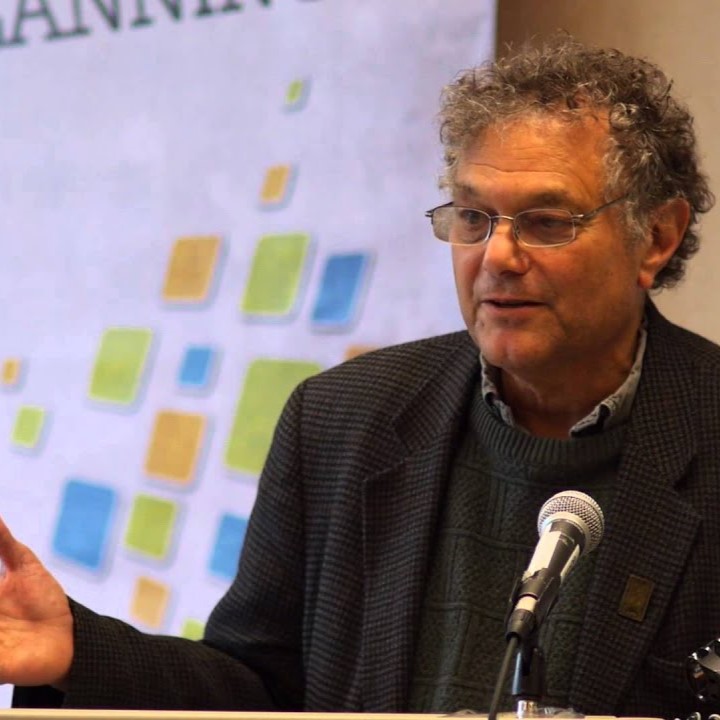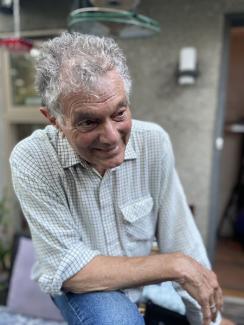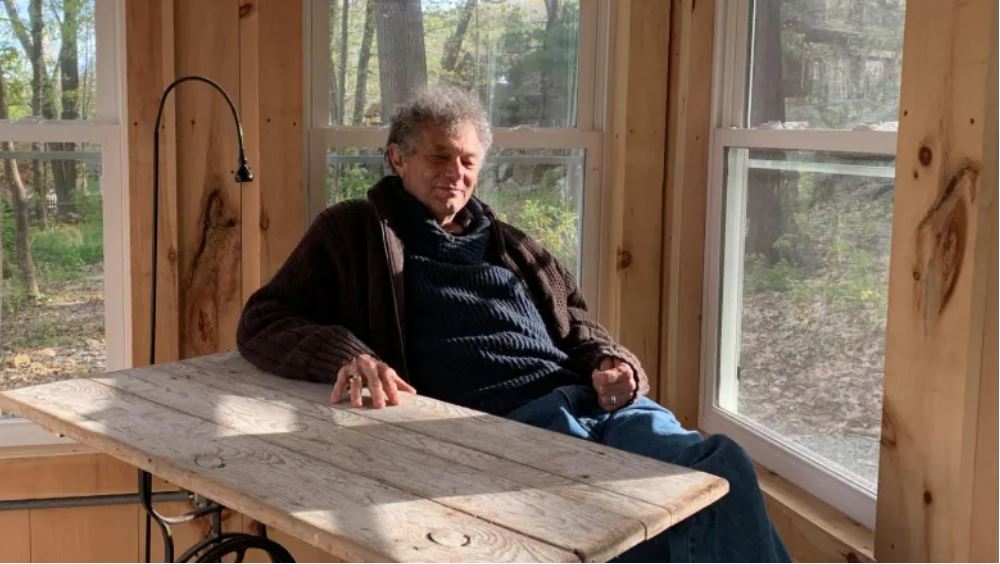
Dear SCARP community and friends,
It is with tremendous sadness that we let you know of the passing of Nathan Edelson. Nathan was an adjunct professor here at SCARP for many years, where he touched many of us and inspired more in causes dear to him.
He also has given to the larger Vancouver community as Vancouver's "former top city planner for the Downtown Eastside", among much else.
SCARP Professor Emerita Leonie Sandercock has written this tribute:

-SCARP Emerita Leonie Sandercock
No truer words were ever spoken than when the CBC news obituary described Nathan Edelson as a ‘local hero’. He has been at the top of my pantheon of community planning heroes since I first got to know him over two decades ago, shortly after moving to Vancouver to teach in the School of Community & Regional Planning at UBC.
A mutual friend had suggested I reach out to Nathan once I arrived in Vancouver, and it only took a couple of evenings of sharing food and stories with he and his late wife Norma-Jean McLaren to convince me that both of them needed to be sharing their accumulated wisdom with our students.
Initially I invited Norma-Jean as a guest speaker in my new ‘Intercultural Planning’ course. Such was her impact in the classroom that pretty soon she and I were co-teaching the entire course. Then when I got a course buy-out, Nathan and Norma-Jean took over the course for almost a decade, to the immense benefit of a whole generation of students. I also regularly invited Nathan to speak to my ‘Intro to Planning History and Theory’ core course, recognizing how the practical wisdom that shone through his ‘war stories’ illuminated better than any theoretical text the crucial relationship between theory and practice.
Nathan was very taken with some of my late husband John Friedmann’s writings about ‘social learning’, which led to him developing his own two semester course for our Masters students, a Social Learning studio, in which he connected students with community partners and guided them in a brilliant ‘learning by doing’ experience.
What made Nathan so compelling as a teacher was his commitment to those same core values that made him so inspirational as a planner: his approach to planning as community building, rather than city building; his caring for people and places and the connections between them; his focus on neighbourhoods and neighbourliness; and perhaps above all, the way he fought for those who, for whatever reason, were marginalized by the systems that have so much control over our lives.
To fight that fight so well and for so long, took a special ingredient rare among practicing planners, even or perhaps especially among those committed to social justice. That special ingredient was political savvy.
Nathan had figured out, from necessity, how to act strategically. Political regimes, progressive or otherwise, come and go, but Nathan showed us how planners working in city and state planning agencies can and do still try to influence which urban/environmental issues get addressed, and how. Committed as he was to the fairness and quality of life in this particular place, Vancouver, Nathan figured out how to operate in unfavorable as well as more favorable political environments. I interviewed him about this for an article I wrote for the Journal of the American Planning Association back in 2004, when Nathan was the senior planner for Vancouver’s Downtown Eastside (DTES). Here’s an excerpt from what I wrote:
“This diverse neighborhood contains low-income single folk living in single room occupancy hotels, a significant urban Indigenous population, a small business community in the historic precinct of Gastown, a business and residential community in Chinatown, a park (Victory Park) which is the symbolic center for war veterans, artists enjoying cheap rents, a gentrifying neighborhood (Strathcona), as well as drug users and street sex workers. The contested spaces of the DTES involve struggles between these various constituencies to define and control the future of the area.
Nathan’s commitment to the revitalization of DTES reflects his core values: specific social justice objectives like affordable housing, stability for low income (SRO) residents, and approaching the drug issue as a health problem rather than a criminal one. For half a dozen years before 2002, under a less than sympathetic City Council, Nathan and his staff worked at coalition building within and beyond DTES to achieve these objectives. There have been many remarkable results from this strategically political work. One is the Vancouver Agreement, between federal, state and city agencies, to put in place a four-part strategy for working with drug users, including the opening in 2003 of the first safe injection site in North America. Other remarkable coalitions have included war veterans and skateboard users coming to an agreement about activities in Victory Park; the Vancouver Drug Users (VANDU) group working with local artists and Chinese community representatives on the Footprints Community Art Project and the redesign of the courtyard of the Chinese Cultural Center; and the leadership of the Chinatown community raising funds for the Carnegie Center (a community center patronized by the area’s poorest residents).
In steering these accomplishments, Edelson describes his work as ‘developing political constituencies who come to believe that it is common sense to do certain things’; for example, that it is as important, for social sustainability, to develop a by-law regulating SRO hotel conversions to protect SRO residents, as it is to protect elderly widows living in rental apartments in the wealthy neighborhood of Kerrisdale. This work of establishing a new social consensus around an issue is deeply political work, drawing on skills of listening, empathy, facilitation, negotiation, and interpersonal relations. In doing this kind of work, planners are shaping attention to some issues and not others, helping to identify and define issues, acting as players in a political force field. Planners’ technical expertise, and their access to information, matter here, but that is not all that matters. The personhood of the planner matters: charisma, yes, but also patience, authenticity, integrity. And, above all, an underlying commitment to some notion of the good city or good society is ever-present”.

What was simply ‘common sense’ to Nathan, I might describe as practical wisdom of the kind so valued by Aristotle in his writings about public life. How many of us have a clue about how to teach that? That’s what was so brilliant, captivating, and inspirational about Nathan as a teacher, and so endearing about him as a human being. The entire community of planning educators and practitioners has been influenced for the better because of his work and his way of being.
SCARP was very fortunate to count him as one of our own, and a whole generational cohort of planners are out in the world now implementing his teachings. He lives on, not just in our hearts but hopefully in what we do every day.
Leonie Sandercock
Professor Emerita, FRSC.
In a statement to CBC, Larry Beasley, who also has been an adjunct professor at SCARP, said:
"Nathan was one of the urban heroes of that generation of city planners and community activists. He led so many efforts that mattered — not only the DTES work, but also the legalization of secondary suites and so much more."

A fund has been established to commemmorate Nathan by the PHS Community Services Society in Vancouver's Downtown Eastside. Funds donated are allocated towards projects aligned with Nathan’s commitments and passions.
People wishing to donate to PHS in Nathan's name would be able to contribute to the fund. Nathan was on the board for years and cared deeply about the people PHS serves.
As we start our new year, new faces have arrived, ready to take on the challenges and quest of our time. We are all privileged to have benefited from Nathan Edelson, one of the transformative spirits that helped make us who we are today. Even so, there are many at SCARP who knew him directly, and at times like this, it is okay to experience many different feelings at these endings and losses. We encourage you to seek support from friends, family, and members of your community, at SCARP and beyond. Any member of UBC also has resources for support if they need someone to talk to, and we invite you to seek them out if it will help.